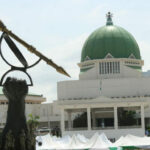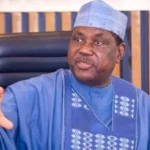By Arc. (Chief) Gabriel. Y. Aduku, OON
In recent times there have been strident calls for the restructuring of Nigeria from a lot of people and from different parts of the country. While some of the calls have primordial and political undertones, a lot of the calls are anchored on well-established premise of ensuring the growth of the country. But why are the calls for the restructuring of the country so loud and reverberating across the country in recent times? I think it is the failure of the leadership and the elite in general to keenly address the nagging needs of the citizenry and all segments of the federating units. This failure on the part of the leadership and the elite, essentially, has led to disequilibrium in the distribution of the common wealth, thereby giving rise to calls for restructuring.
While I subscribe to the call for the restructuring of the country, I do not seem to agree with the voices of those who see restructuring wholly from the perspective of restructuring along ethnic or regional lines. Restructuring along regional divides alone will not achieve the much desired results. It may simply end up as a pyrrhic victory. I also do not think that restructuring the country, so that the regions will have control of the resources in the regions is the best way to go. Certainly, I believe in resource control but my point is that having control of the resources in one’s region is not the panacea to the problem. In fact, it may end up creating more problems. I agree with those who have posited that mineral resources should not be the only and real resources we should be trying to control. I also buy the idea that the real owners of the resources are not usually the real beneficiaries of the resources but the political elite in the host communities or regions.
- Attacks on Fulani in S/West: Act now before we lose Nigeria, Tofa tells Buhari
- Ethno-religious sentiments affecting governance in Nigeria – Lawan
There has to be a more fundamental peg to restructuring the country if we must achieve the results and benefits of restructuring. For me, the focus remains using the revenue accruable from the resources within our environments for the development of the ultimate resource: human resources.
Education is critical and absolutely fundamental for developmental growth and enduring positive progress. It cures ignorance, which is a chronic disease afflicting many in the country. Restructuring the country should start from a fundamental restructuring of our educational system and a massive investment into the educational sector. Let us pause and ask ourselves a question: if we have control of resources in our communities and our youths are lacking in quality education, what would be the outcome? It means we will still be having militancy, banditry and other related crises. We need to restructure the educational system by rebuilding schools, training and retraining the teachers, re-examining and enhancing the curricula, among others.
It is through quality education that we can lay the foundation for a country where everyone will have equal opportunity to excel.
I wish to state emphatically that human resource supersedes mineral resources, which is why we need to restructure the whole gamut of our educational system. Obafemi Awolowo once said, and I subscribe wholeheartedly to it, that any system of education which does not help a man to have a healthy and sound body and alert brain, balanced and disciplined instinctive urges, is both misconceived and dangerous. That is the kernel for the urgent need to revamp and restructure our educational system.
In addition to restructuring the educational sector, there has to be a mindful and well-articulated effort to enthrone a positive value system as we had in our traditional societies before the oil boom of the seventies and eighties. We need to have the right social values in place if we have to reap the benefits of a restructured Nigeria. A moral rearmament anchored on waging wars against indiscipline and insincerity can be driven through education, moral suasion and leadership by example, from the family, the community and public office holders.
Moral rearmament as a tool for social orientation can, significantly reduce the level of insecurity in the land and usher in a system where positive values are appreciated. Moral rearmament will also aid the enthronement of a just and equitable society where the resources, mineral and all, will be used for the good of all.
Moral rearmament will not necessarily be a government affair alone. It can be an initiative driven by the government but entrenched in the families, communities, local governments and state and federal levels.
Most of the fears which tend to drive the present day agitations for self-determination stem from ethnic and tribal dominations. The minority tribes are afraid of the dominance of the majority tribes, while the majority tribes are afraid of the onslaught of the agitators from the minority tribes. The fears in most cases are real. I believe that while education and moral rearmament are vital for survival and sustenance, managing the ethnic and tribal complexities of our national life should be tackled through a bottom-up approach in the twin issues of responsibility and authority. Each federating unit should be made and reassured of a sense of belonging through a well-articulated charter of equity. Authority and responsibility should be driven from the local authorities (family, community, town, local government), to the state and the centre. We can look at such a structure, the things that worked effectively, modify them based on current realities and incorporate them into our national code. When communities and native authorities have a stake in the collective survival of the country, they will play their roles keenly, thus reducing the fears of dominance or stampede, which are fuelling crises in the country.
I share the opinion of others who have argued that Nigeria should remain a secular state. There should be a distinct separation of activities between the government and religious bodies, irrespective of the faith or the denomination. The government, for instance has no business in funding pilgrimages of any religious faith. A restructuring of the country without taking into account our religious diversity and with a concerted effort by government to ensure neutrality in religious matters will not bring about the much desired growth and development.
Devolution of power is an absolute necessity. The present political arrangement whereby so much power is concentrated in the states and federal level is unnecessary. It breeds economic waste and is unsustainable. There is so much concentration of power at the centre and unwieldy law making organs, which in reality, especially in the last 17 years, seem to be more and more detached from the people. A natural realignment of political authorities is the answer to realizing peaceful co-existence. There has to be a conscious transfer of power from the centre/state to local authorities for effective administration of all units. I also think that traditional authorities should be given constitutional roles that can help maintain security, at least. The issue of community policing cannot be put on the back-burner any longer. The legislature should be made to be a part-time role at the federal and state levels. I also believe that when the legislature is constitutionally made to be a part-time organ of government, we will begin to have men and women worthy of character and imbued with passion for the people and the country in the national and state assemblies.
These are just a few of my thoughts on restructuring the country and they are, by no means conclusive. It is my considered opinion that political restructuring is imperative, but we also need to pay close attention to the subliminal factors that can make such a restructuring a positive one. It should not be restructuring along geo-political or ethnic/linguistic boundaries alone. We should look comprehensively at our past, current state-nation structure and where we want to be in a world that is now a global village.
It should be noted that any restructuring effort should carry along the legislative arm of government. This is because, every restructuring will affect the constitution and the legislature is the only arm of government that has power to tinker with the constitution.
Arc. (Chief) Gabriel. Y. Aduku is a former Minister of State

 Join Daily Trust WhatsApp Community For Quick Access To News and Happenings Around You.
Join Daily Trust WhatsApp Community For Quick Access To News and Happenings Around You.


